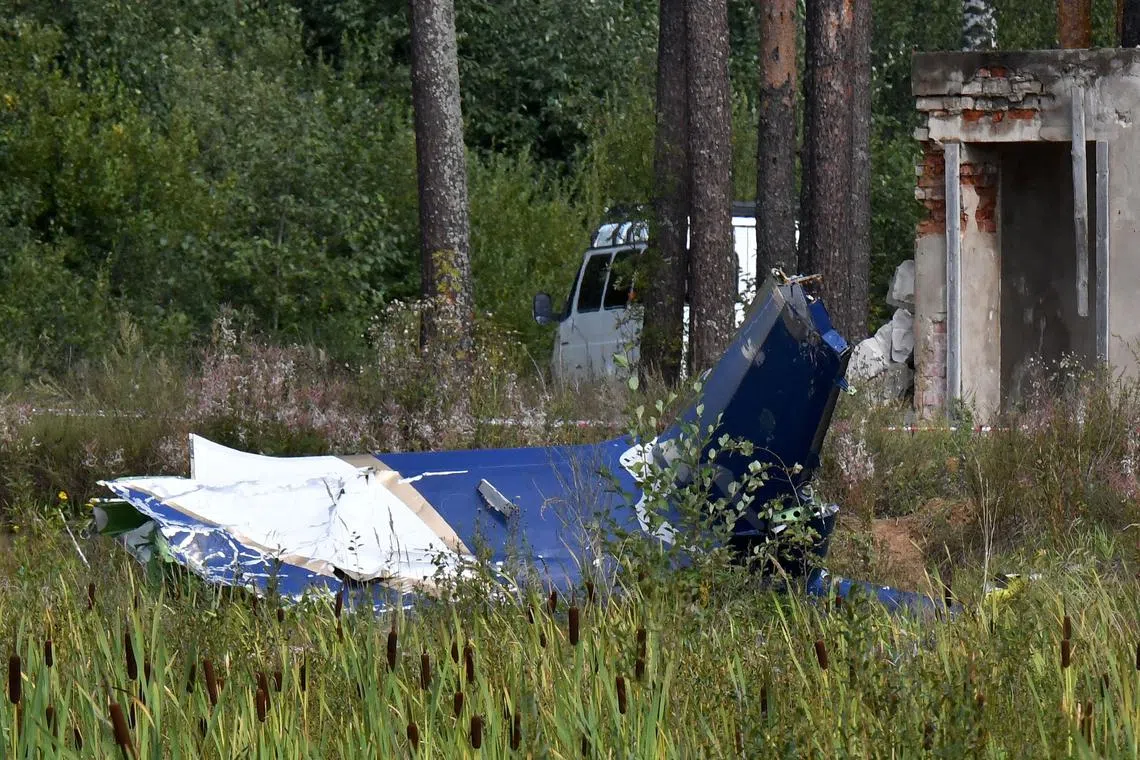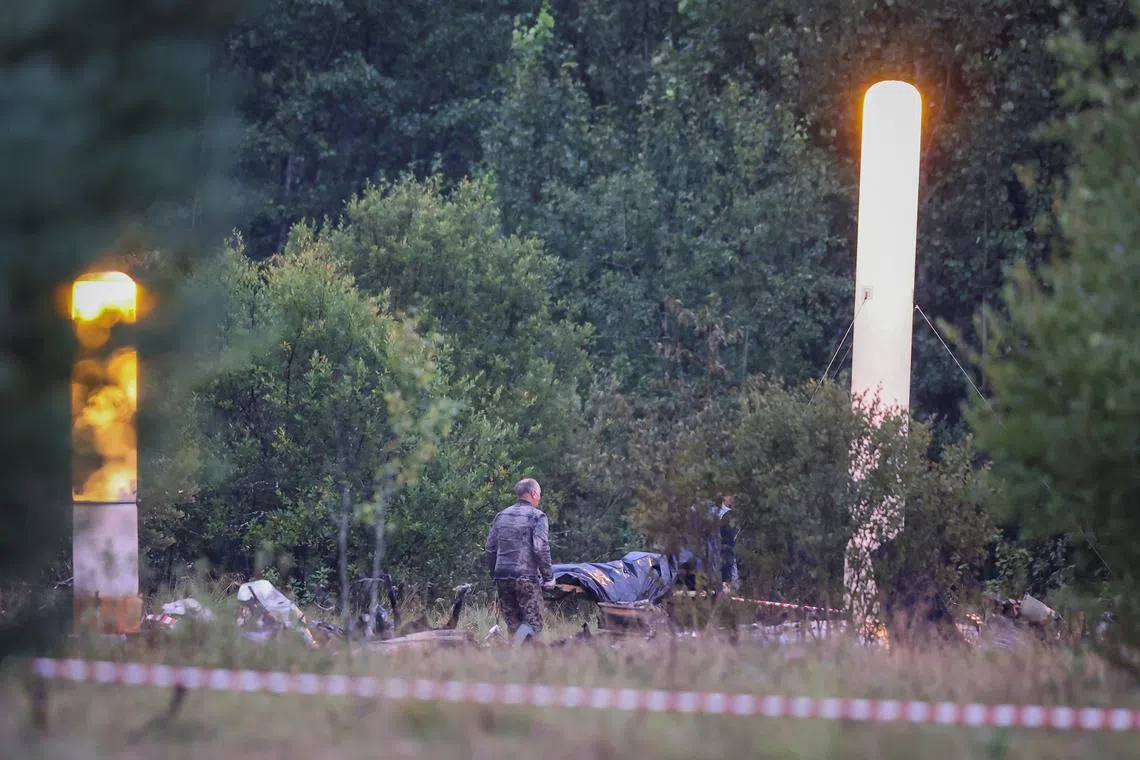Investigators trawl site of plane crash believed to have killed Wagner boss Prigozhin
Sign up now: Get ST's newsletters delivered to your inbox

The Embraer Legacy 600 executive jet crashed near the village of Kuzhenkino in the Tver region north of Moscow on Aug 23.
PHOTO: AFP
Follow topic:
MOSCOW - Crash investigators on Thursday picked through the wreckage of a jet said to have been carrying Russian mercenary chief Yevgeny Prigozhin that crashed with no survivors, he led a mutiny against the army leadership.
Investigators opened a criminal probe, but there was no official word on what may have caused Wednesday evening’s crash, or even official confirmation of Mr Prigozhin’s death beyond a statement from the aviation authority saying he was on board.
The Kremlin and the Defence Ministry also made no comment on the fate of Mr Prigozhin, head of the Wagner mercenary group and a self-declared enemy of the army top brass over what he said was its incompetent prosecution of Russia’s war in Ukraine.
President Vladimir Putin made a virtual statement to a summit of the Brics nations in South Africa, which Russian Foreign Minister Sergei Lavrov was attending. Neither referenced the plane crash in which 10 people were said to have been killed.
State media gave the disaster low-key coverage.
The Embraer Legacy 600 executive jet, which had been flying from Moscow to St Petersburg and was reported to have also been carrying senior members of Mr Prigozhin’s team, crashed near the village of Kuzhenkino in the Tver region north of Moscow.
A Reuters reporter at the crash site on Thursday morning saw men carrying away black body bags on stretchers. Part of the plane’s tail and other fragments lay on the ground near a wooded area where forensic investigators had erected a tent.
The Baza news outlet, which has good sources among law enforcement agencies, reported that investigators were focusing on a theory that one or two bombs may have been planted on board.
Residents of Kuzhenkino said they had heard a bang and then saw the jet plummet to the ground.
One villager, who gave his name as Anatoly, said: “In terms of what might have happened, I’ll just say this: it wasn’t thunder, it was a metallic bang – let’s put it that way.”
Unnamed sources told Russian media they believed the plane had been shot down by one or more surface-to-air missiles. Reuters could not confirm that.
Mourners left flowers and lit candles near Wagner's offices in St Petersburg.
Master of illusions
“The first thing I believe is that this man committed the most serious crimes possible for a military man to commit,” a woman who gave her name only as Yelena told Reuters on the streets of Moscow. “I think his safety was only guaranteed in exchange for him stopping what he started. But he didn’t stop.”
A man who only gave his name as Boris said: “This man was, in fact, a master of illusions. Maybe he didn’t die. No one knows yet. They won’t show the funeral or the body.”
A Telegram channel linked to Wagner, Grey Zone, pronounced Mr Prigozhin dead on Wednesday evening, hailing him as a hero and a patriot who it said had died at the hands of unidentified people it called “traitors to Russia”.
Amid the absence of verified facts, some of his supporters have pointed the finger of blame at the Russian state, others at Ukraine, which was due to mark its Independence Day on Thursday.
Whoever or whatever was behind the crash, his death would rid Mr Putin of someone who had mounted the most serious challenge to his authority since he came to power in 1999.

Emergency specialists carry a body bag near wreckages of the private jet at the crash site in the Tver region, Russia, on Aug 24.
PHOTO: REUTERS
Mr Prigozhin’s death would also leave Wagner, which incurred Mr Putin’s wrath in June by staging a failed mutiny against the army top brass, leaderless and raise questions about its future operations in Africa and elsewhere.
The plane showed no sign of a problem until a precipitous drop in its final 30 seconds, according to flight-tracking data.
Wagner co-founder also on plane
Rosaviatsia, Russia’s aviation agency, published the names of all 10 people on board the downed plane, including Mr Prigozhin and that of Mr Dmitry Utkin, his right-hand man.
Mr Abbas Gallyamov, a former Mr Putin speechwriter turned critic, suggested without offering evidence that the Russian leader was behind the crash and had now strengthened his authority.
“The establishment is now convinced that it will not be possible to oppose Putin,” Mr Gallyamov wrote on the Telegram messaging app. “Putin is strong enough and capable of revenge.”
Mr Bill Browder, a businessman with years of experience in Russia and another Kremlin critic, agreed with that theory.
“Putin never forgives and never forgets. He looked like a humiliated weakling, with Prigozhin running around without a care in the world (after the mutiny). This will cement his authority,” Mr Browder wrote on X, formerly known as Twitter.
United States President Joe Biden told reporters he did not know what had happened.
“But I’m not surprised,” Mr Biden said on Wednesday.
Second plane linked to Prigozhin
Flightradar24 online tracker showed that the plane had dropped off the radar at 6.11pm (11.11pm Singapore time). An unverified video clip on social media showed a plane resembling a private jet falling out of the sky.
Soon after the plane crashed, a second private jet thought linked to Mr Prigozhin which also appeared to be heading to St Petersburg, his home base, turned back to Moscow, flight tracking data showed, and later landed.
Mr Prigozhin, 62, spearheaded the mutiny against the army leadership on June 23 to 24 which Mr Putin said could have tipped Russia into civil war. Wagner fighters shot down Russian helicopters during the revolt, killing an unconfirmed number of pilots and infuriating the military.
He had also spent months criticising Russia’s war in Ukraine – which Moscow calls a “special military operation” – and had tried to topple Defence Minister Sergei Shoigu and Mr Valery Gerasimov, chief of the General Staff.
Many Russians had wondered how he was able to get away with such brazen criticism without consequence.
The mutiny was ended by an apparent Kremlin deal, which saw Mr Prigozhin agree to relocate to neighbouring Belarus. But in practice he had appeared to move freely inside Russia after the agreement which had reportedly guaranteed his personal safety.
Mr Prigozhin posted a video address on Monday, which he suggested was made in Africa. He turned up at a Russia-Africa summit in St Petersburg in July. REUTERS

